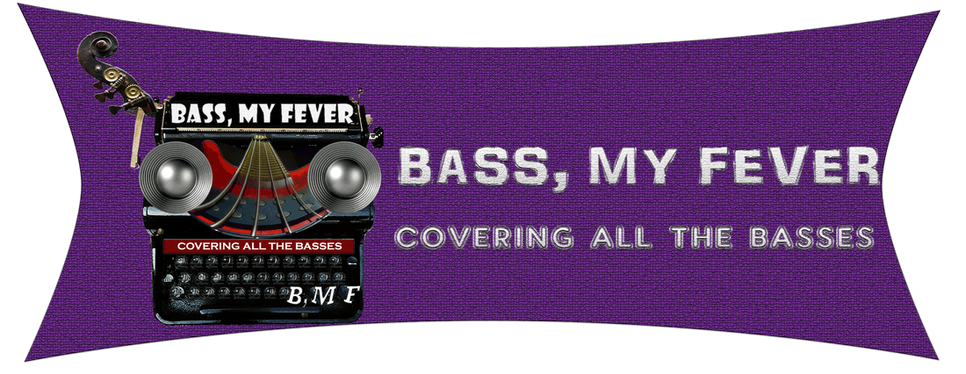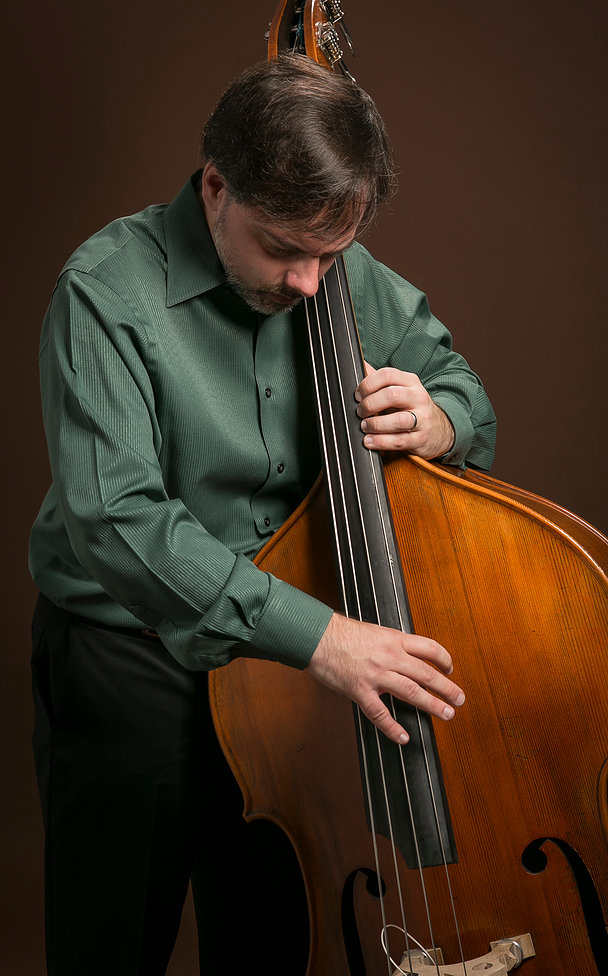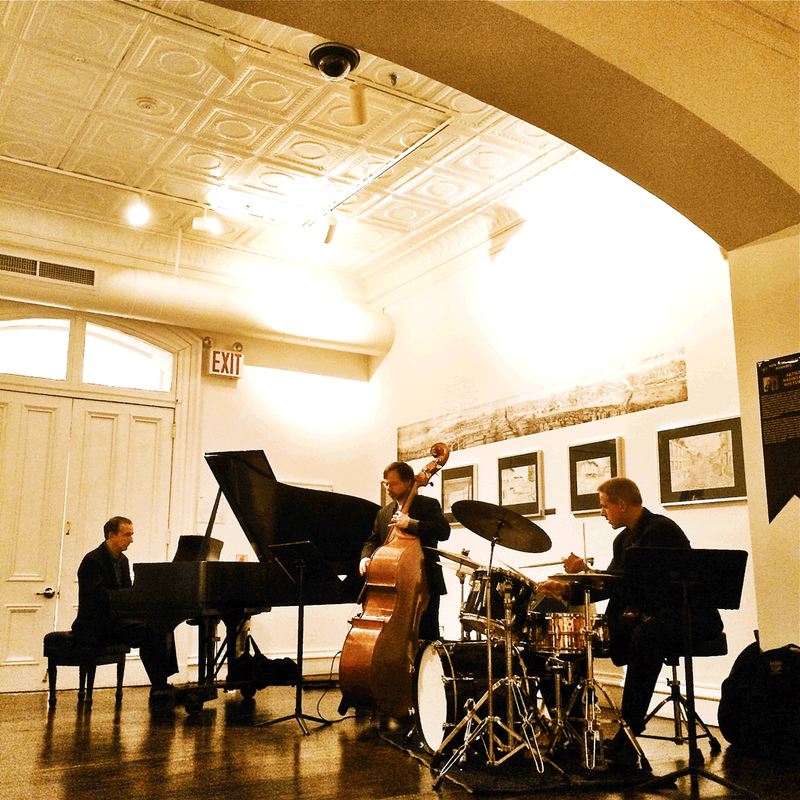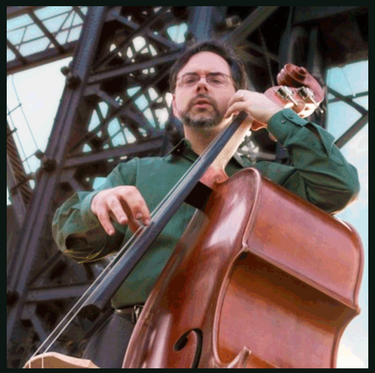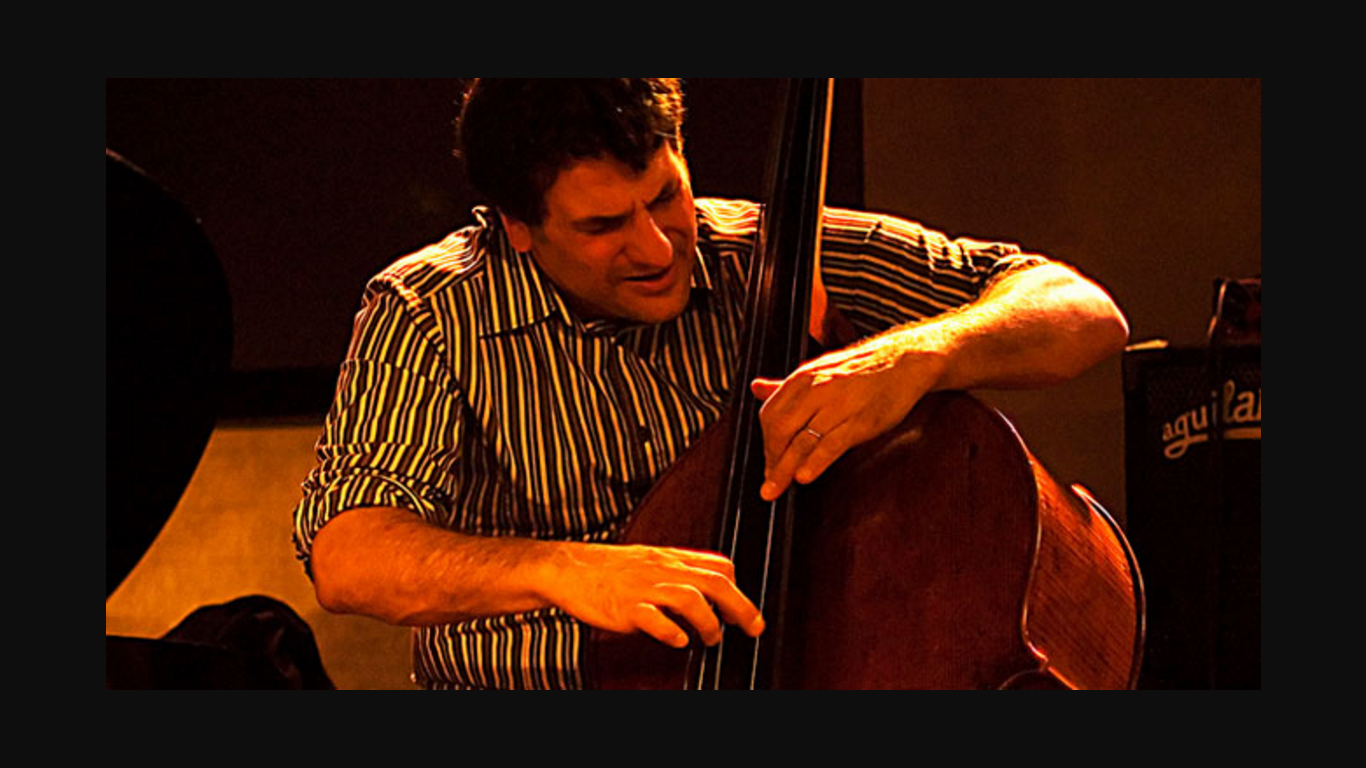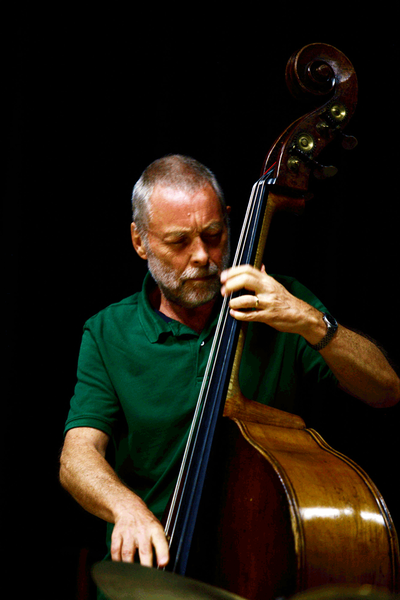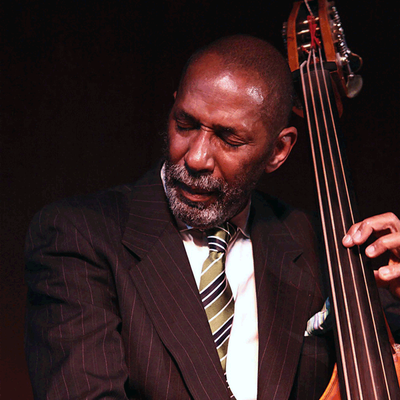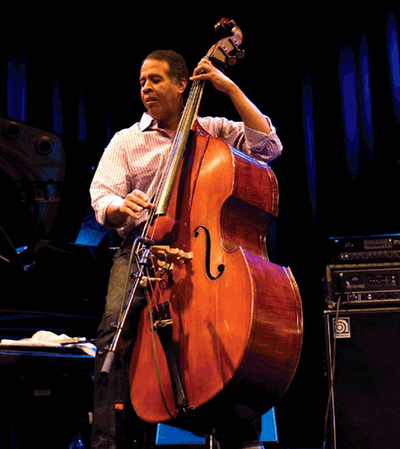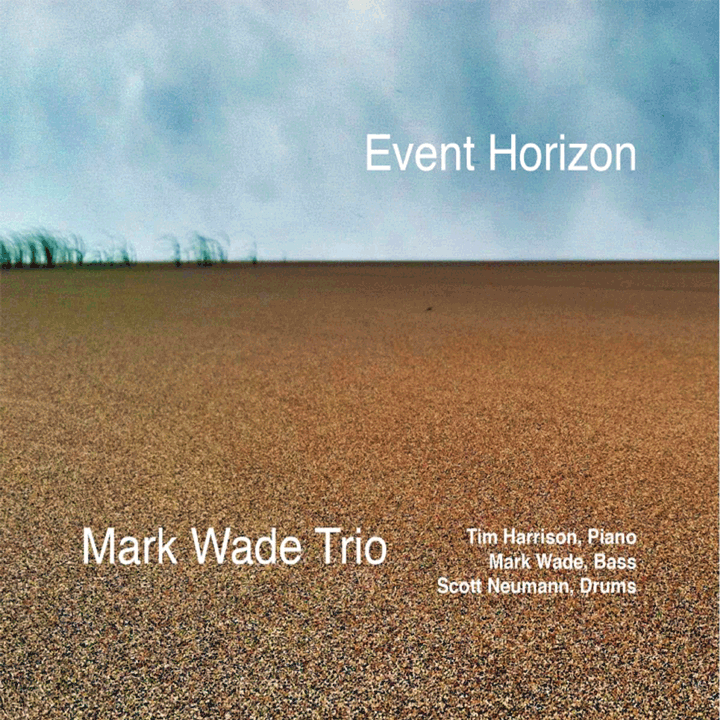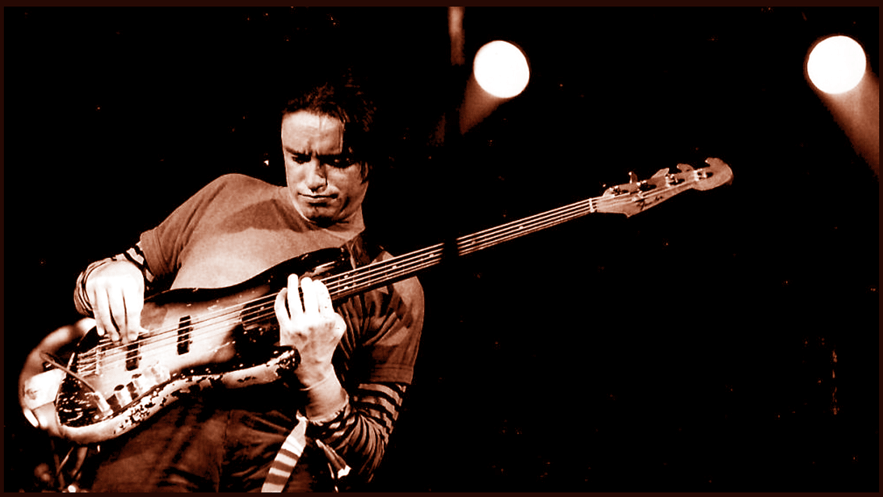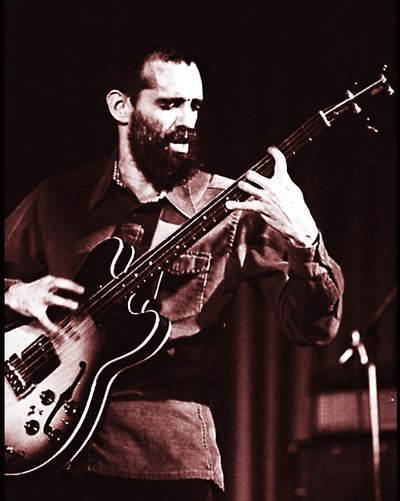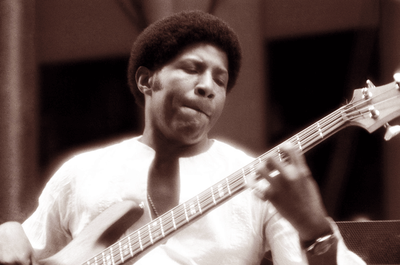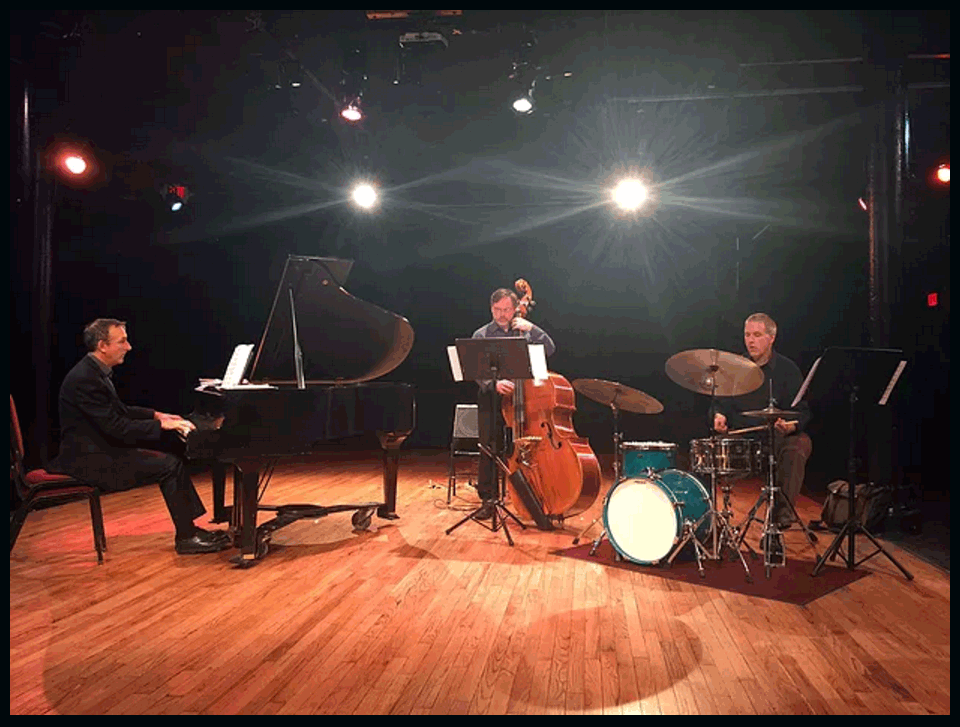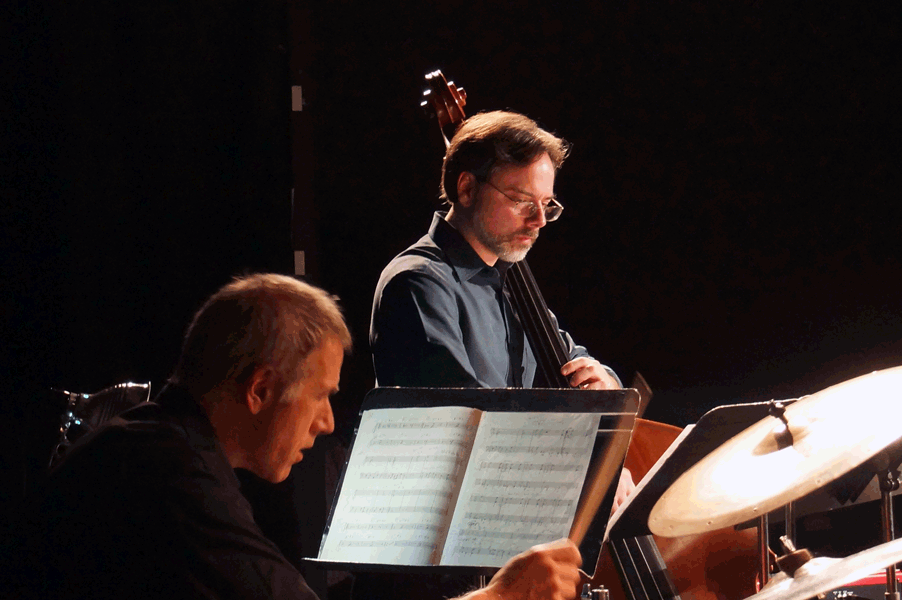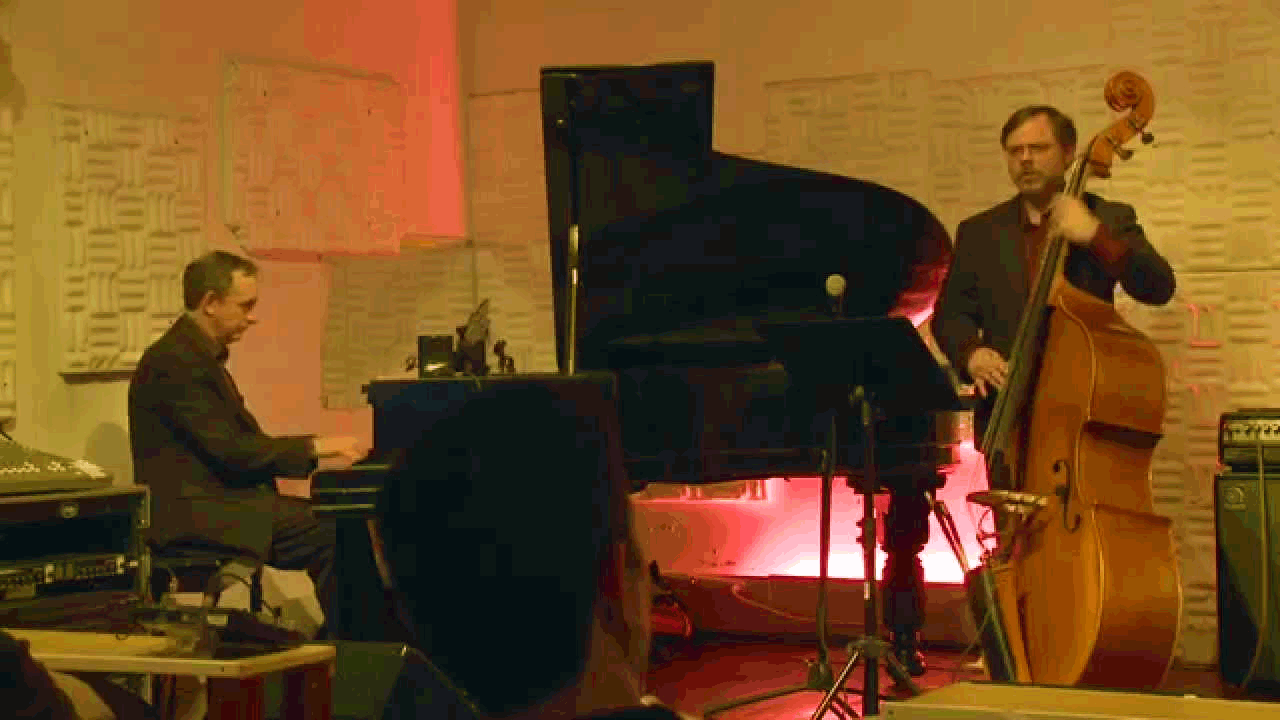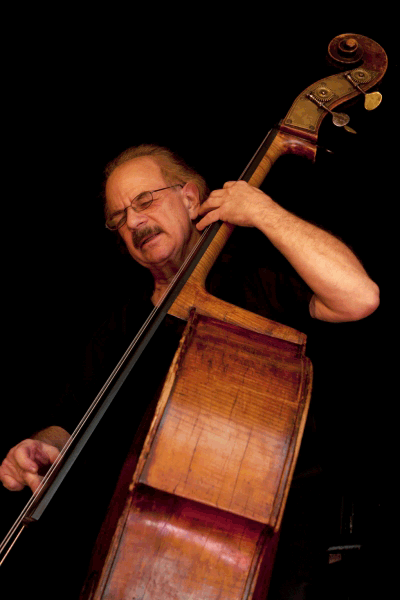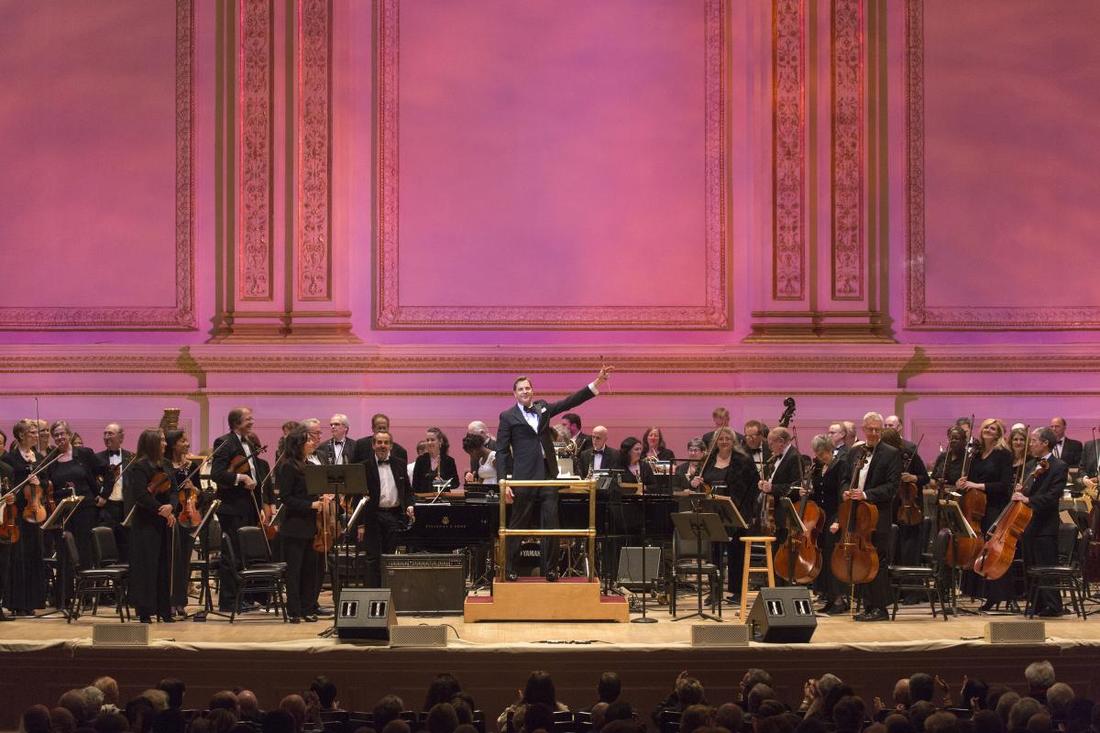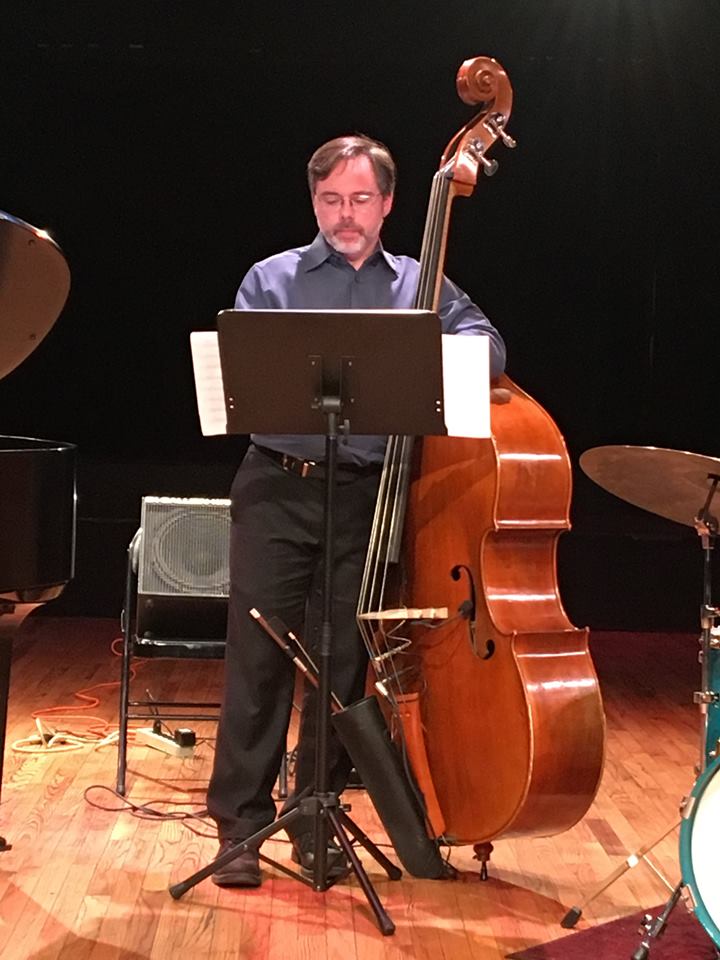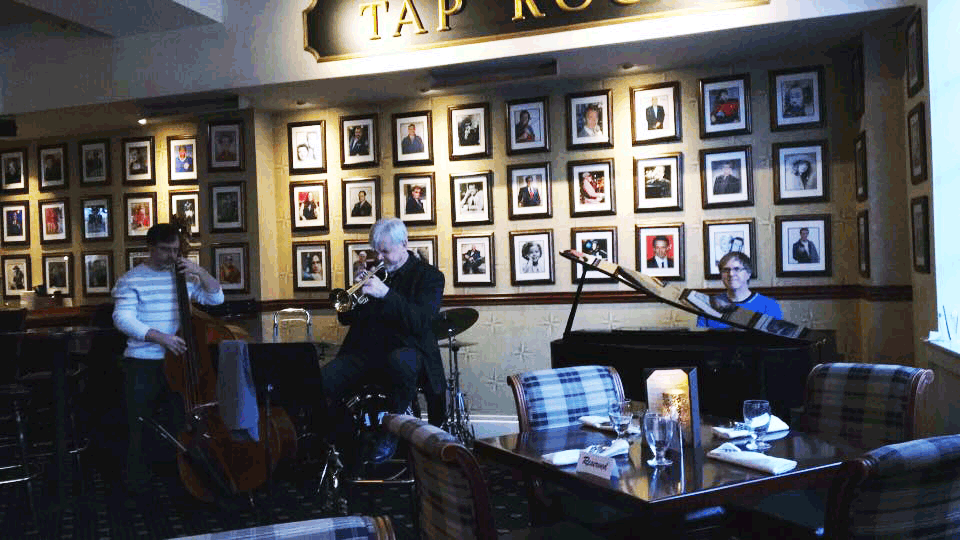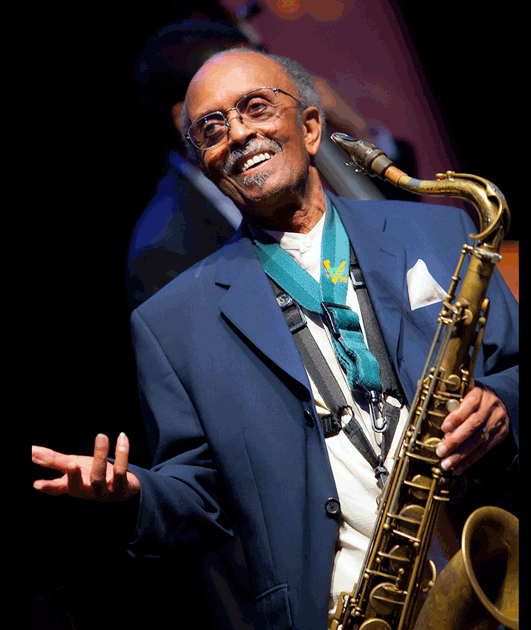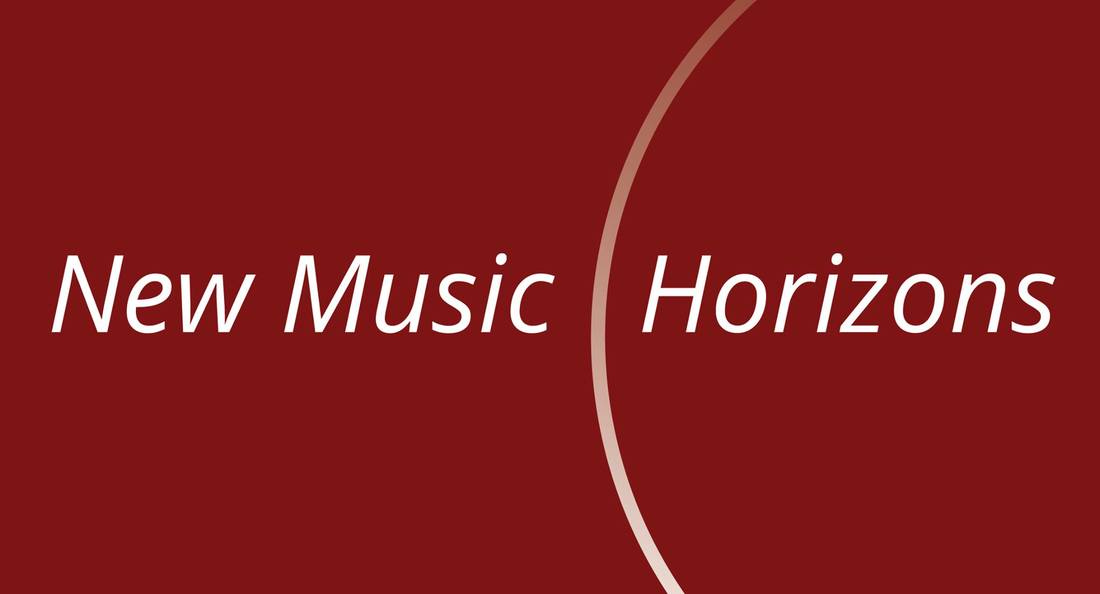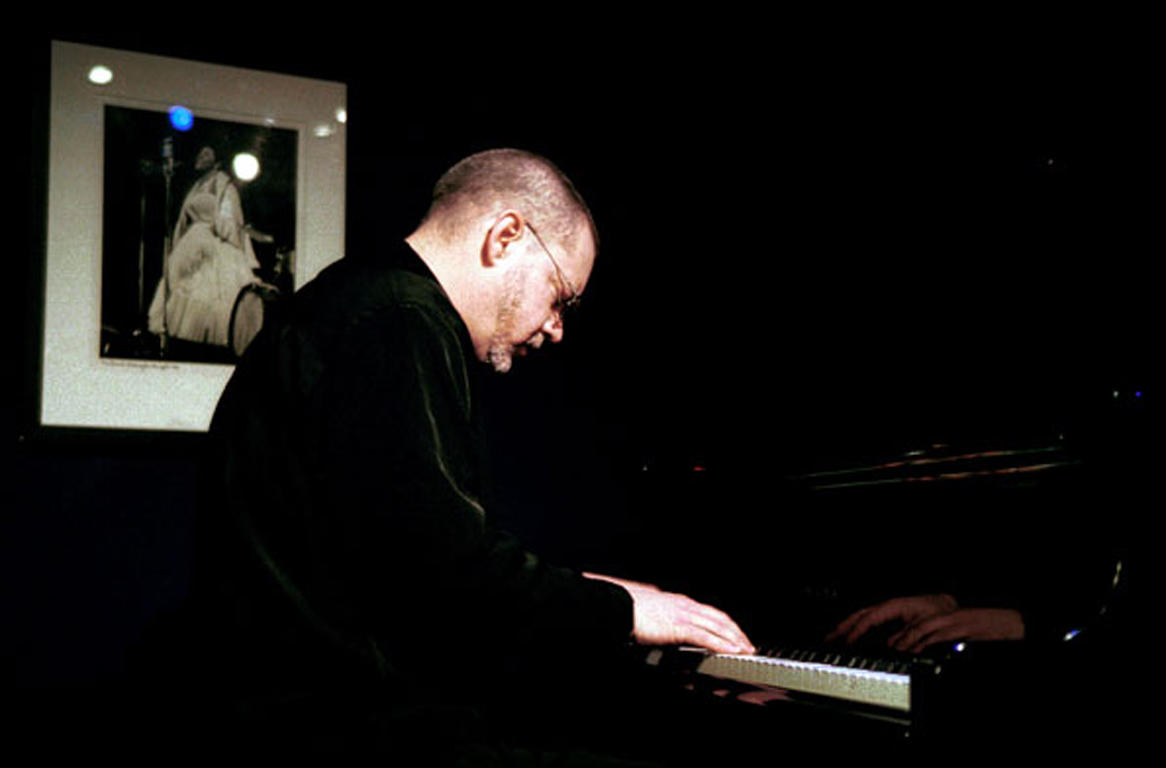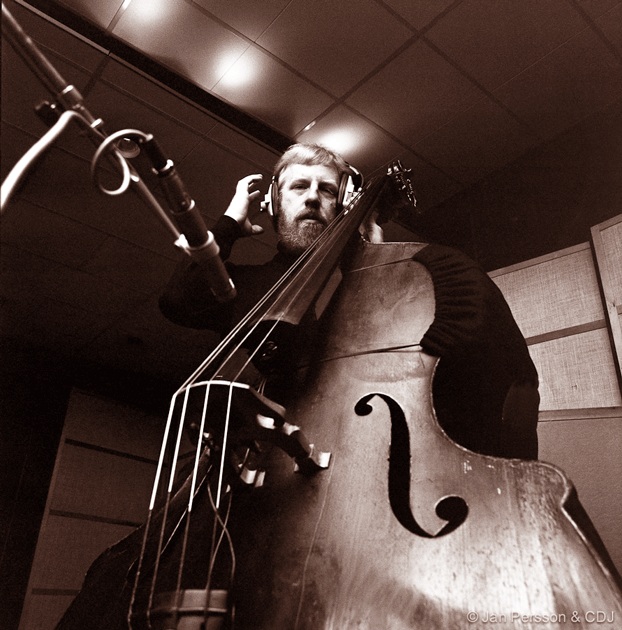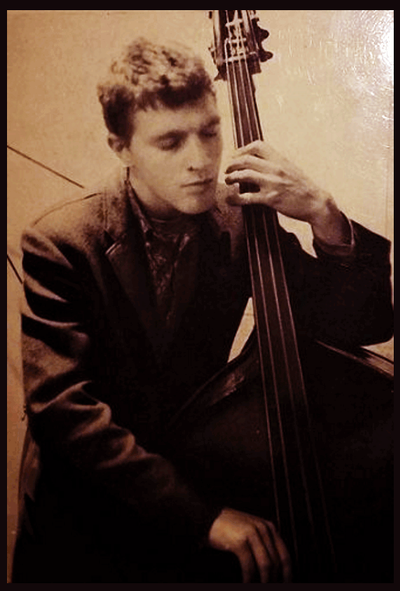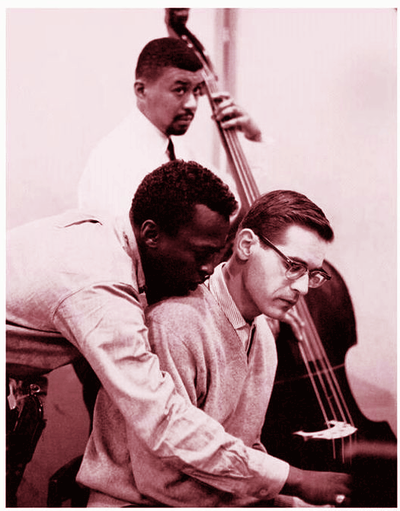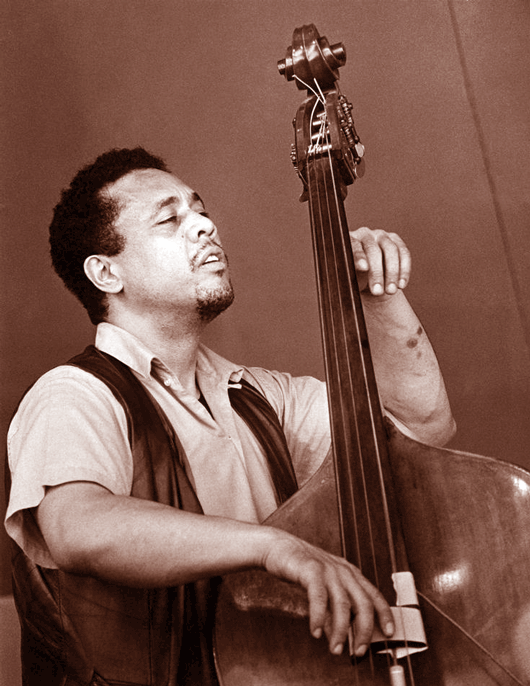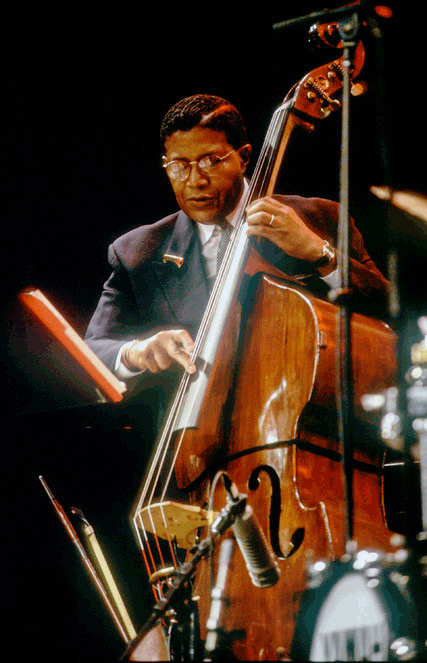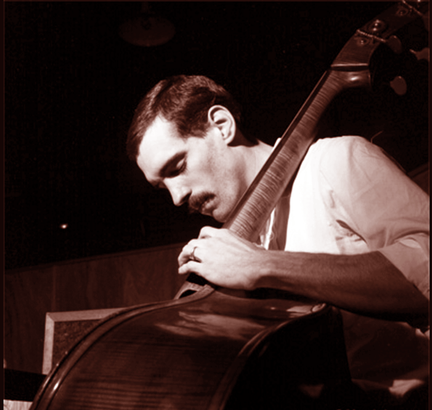INTERVIEW WITH
MARK WADE
|
|
«The more I listened to jazz, the more I realized that if I was to be able to participate in this music I was going to need to approach it as a double bass player» |
THE MUSICIAN OF
|
IL MUSICISTA DEI
|
|
«The only way to grow as an artist is through expanding your horizons», words that sound as an ideal frame for a brilliant career and it is not by chance that to pronounce them is the author of the extraordinary picture included therein, that is to say, one of the most currently celebrated and talented upright bassist, Mark Wade, who - through his debut solo album Event Horizon - has made of modern jazz such an imaginary subtle line to overstep over and over so as to shape and develop the original sound created together with his own solid trio, consisting of a refined pianist like Tim Harrison and an expressive drummer like Scott Neumann. It seems impossible to sum up in a few lines a path - a very backwards road as he defines it - so rich in experiences as well as suggestions covered by Wade in 20 years of artistic activity, since he started in New York City as a freelance musician playing so various styles of music. Maybe it was for this reason we have been so surprised to read that he started to play rock on electric bass, and that he devoted himself to classical music initially as an hobby, joining a community orchestra only when he got out of college and today we find his name included in the top 10 bassists of 2016 voted by the prestigious Downbeat Magazine Reader's Poll, along with artists like Ron Carter, Dave Holland, Stanley Clarke etc. |
«L’unico modo per crescere come artista equivale ad espandere i propri orizzonti», parole che potrebbero fungere da cornice ideale ad una carriera brillante e non è un caso se a pronunciarle sia proprio l’autore del quadro straordinario custodito al suo interno, Mark Wade, uno dei più acclamati contrabbassisti di talento della scena contemporanea. Un musicista che con l’album di debutto, Event Horizon, ha trasformato il modern jazz in una linea immaginaria molto sottile da superare ogni volta, al solo fine di plasmare e sviluppare un sound originale creato insieme al compatto trio di cui è leader, costituito dal raffinato pianista Tim Harrison e dal batterista espressivo Scott Neumann. Sembra quasi impossibile riassumere in poche righe un percorso (da lui stesso definito “a ritroso”) così ricco di esperienze e di suggestioni, conseguito da Wade in 20 anni di attività artistica, da quando mosse i suoi inizi a New York City come musicista freelance, interpretando repertori eterogenei. Forse è per questo che ci ha colto così di sorpresa sapere che il suo primo approccio alla musica sia avvenuto suonando rock sul basso elettrico, che si sia avvicinato al repertorio classico quasi per hobby e che solo dopo il college si sia unito ad una orchestra. Eppure oggi vediamo scorrere il suo nome nella top 10 dei bassisti del 2016 votata dal sondaggio dei lettori della prestigiosa rivista Downbeat Magazine, accanto a quello di musicisti del calibro di Ron Carter, Dave Holland, Stanley Clarke ecc. John Patitucci
|
|
Twenty years, we said, a period of time useful to him to draw up his own identity firstly as an artist and then as a double bass player, with an instrument that gave him the opportunity to express himself as a jazz and an orchestral musician aside from proving to own a creative and emotional voice as a composer. The album Event Horizon released for the second time on February 2016 by the berliner Edition 46 Records have received quietly all the possible recognitions especially at an international level (in Europe and Japan). There is no concidence that could explain the considerable number of enthusiastic critical reviews worldwide - our own included - not to mention the inclusion by Arnaldo DeSouteiro, founder of Jazz Station Records and NARAS-GRAMMY voting member - of this remarkable record in the top 10 for his Best of 2015 in the categories of Best Acoustic Bass, Best Composer, and Best Instrumental Group, and #16 for Best Album of the Year. That’s an almost unique outcome for a really uncommon artist. |
Venti anni, dicevamo, un periodo di tempo utile a delineare la propria identità anzitutto come artista e poi come contrabbassista, con uno strumento che gli ha consentito di esprimere se stesso come musicista jazz e classico oltre che a dar prova di possedere una voce originale e di grande sensibilità in qualità di compositore. Non c’è coincidenza che tenga dinanzi al consenso unanime su scala internazionale (in Europa e in Giappone) ottenuto dall’album Event Horizon giunto alla sua seconda pubblicazione stavolta per l’etichetta berlinese Edition 46 Records (Febbraio 2016). Un disco che con discrezione è riuscito ad ispirare le recensioni dai toni più entusiastici – compresa la nostra – in tutte le più rinomate riviste specializzate, senza dimenticare l’inclusione di questo lavoro di indubbio pregio artistico nella top 10 del 2015 curata da Arnaldo DeSouteiro, fondatore della Jazz Station Records e membro votante del Naras-Grammy, nelle categorie di miglior basso acustico, miglior compositore, e gruppo strumentale, e come miglior album dell’anno 2016. Si tratta di un risultato/fenomeno quasi unico per un artista non comune. |
|
Yes, because from the very beginning Wade’s approach to music immediately showed his own peculiar transversality, characterised by an eclecticism gained through deepening a very large range of inspirations, which seems to have been a prerequisite for his growth as a bass player tout court. And this is all the more true if we consider that he firstly started to play electric bass, a solid contribution to a background of skills and experiences that led him, in hindsight, also to recognize the sound of Jaco Pastorius as one of the main influences also for the upright bass technique; particularly illuminating are his own considerations about Steve Swallow playing as well as the one of Bob Cranshaw as regards the versatility that such musicians have proved on both instruments. Opinions maybe enhanced under the guidance and the inspiration of the great musician Mike Richmond, his teacher at New York University, a key moment of his training when probably he finally decided to switch to upright bass after about a year and a half of college and to carry on down the current road to jazz, a language that according to his personal vision can be new and different at the same time with all the challenges involved in developing your own voice; a complex of sounds which never stop to flow and which stimulates each musician to be flexible in such various musical situations and patterns. |
Sì, perché fin dall’inizio l’approccio di Wade alla musica ha rivelato la propria connotazione trasversale, votata a quel tipo di eclettismo che solo l’approfondimento di un così ampio raggio di ispirazioni (jazz, classica ma anche pop e rock) poteva suggerirgli di imprimere nelle proprie interpretazioni, il che sembra sia un prerequisito obbligato per una maturazione continua come artista tout court. Un aspetto che si rivela ancora più autentico se consideriamo i suoi inizi da bassista elettrico, un background formativo che lo ha persino indotto a riconoscere il sound di Jaco Pastorius come una delle maggiori influenze e linee guida anche per lo studio della tecnica del contrabbasso; illuminanti sono infine alcune delle sue considerazioni a proposito dello stile di Steve Swallow e di Bob Cranshaw per la versatilità che simili musicisti hanno dimostrato di avere su entrambi gli strumenti. Un punto di vista probabilmente consolidato sotto l’egida del suo maestro alla New York University, il grande Mike Richmond, in un momento cruciale della sua formazione, in cui Mark Wade decise con un fare più fermo e risoluto di continuare a calcare la strada del jazz, un linguaggio che in base alla sua personale visione può rivelarsi, nel frangente di un’unica e breve battuta, sempre nuovo e differente, con tutte le sfide che la ricerca di una propria dimensione intima e ideale porta con sè; un complesso di suoni che non smettono mai di rifluire ma che inducono ciascuno strumentista ad essere flessibile nei contesti e negli schemi musicali più disparati. |
|
This is what Mark Wade proved to be until this point of his career. But he doesn’t limit his horizons to jazz and classical music as a musician, he’s also opened to popular music as a New York Pops Teaching Artist in addition to be the founder and director of New Music Horizons, an high profile project achieved by a no-profit organization dedicated to the support of new music in the fields of contemporary jazz and classical music in the NYC metro area. This is «a way to help bridge the gap between audiences and composers and give new music a chance to grow at the grassroots level» a challenging mission that he explains to us together with other details about his own career and future plans in this following interview so kindly granted to Bass, My Fever and that we are so proud to propose to you today. |
Questo e molto altro ha dimostrato di essere Mark Wade, giunto a questo punto della propria carriera. Come dicevamo all’inizio, la sua peculiarità risiede nel non limitare i propri orizzonti - come musicista - al jazz o alla musica classica, ma nell’espanderli e lui questo lo ha fatto anche aprendosi alla Popular Music nel ruolo di insegnante della New York Pops Orchestra oltre che investendo molte delle proprie energie come fondatore e direttore dell’organizzazione no-profit New Music Horizons, un’iniziativa di grande respiro volta al sostegno della nuova musica nell’ambito del jazz conteporaneo e della musica classica nell’area metropolitana di New York. «Una strada– ci spiega l’artista – utile a colmare il vuoto tra i compositori emergenti ed il loro pubblico potenziale al fine di garantire alla nuova musica una chance di crescita anche a livello di popolarità, tra la gente comune», una sfida ardua di cui Wade ci mette a parte, rivelando ulteriori dettagli sulla propria carriera ed i progetti futuri in questa intervista da lui così gentilmente concessa a Bass, My Fever e che siamo orgogliosi di proporvi oggi.
|
|
BMF: Mark, your solo debut album “Event Horizon” have had an extraordinary international impact, in its own right. But your career as both an orchestral musician and a jazz double bass player has been continually growing over the last 20 years. Would you like to tell us about the first moment you understood that jazz was your main road, mostly as a composer? What or who did inspire you to make this album at this point of your career? MW: I started studying as a jazz composer when I was halfway my time at New York University. At the time, taking composition lessons was popular with most of the jazz students there. It was something that I took to right away. In fact, I found myself composing music that was a bit above my ability as a bassist. After I graduated, I didn't spend much time writing music and instead devoted my time to become a better bassist and expand my career as a working sideman here in New York. I always knew I didn't want to make my own album until I felt I really had something to say both as a writer and as a player. In 2013, I had an opportunity to put together a band for a concert. Once I heard Tim Harrison (piano) and Scott Neumann (drums) play my music, that's when it all came together. I knew it was finally time to record. After writing some more music for the band and playing a few more gigs, we went into the studio about a year later. I waited much longer than some people do to start their recording career, but I'm glad I did. It was worth the wait. |
BMF: Mark, il tuo album di debutto solista “Event Horizon” ha ottenuto, a ragione, un riscontro internazionale straordinario. La tua carriera come contrabbassista classico e jazz è andata sempre crescendo negli ultimi 20 anni. Vorresti descriverci il primo momento in cui hai effettivamente capito che il jazz sarebbe stato la tua strada, nello specifico come compositore? Cosa ti ha spinto a concepire questo album, giunto a questo punto della tua carriera? Mark Wade: Ho iniziato a studiare come compositore jazz quando ero a metà del mio percorso alla New York University. In quel periodo, seguire lezioni di composizione era abbastanza usuale per la maggior parte degli studenti iscritti. Si è rivelata un’esperienza utile a farmi intraprendere la strada giusta. Infatti mi sono ritrovato a comporre musica di un livello di poco superiore alle mie abilità come bassista. Dopo la laurea non ho investito molto tempo nella scrittura ma ho impiegato tutte le mie energie per maturare come musicista ed ampliare il mio bagaglio di esperienze come sideman qui a New York. Sono sempre stato convinto di incidere il mio primo album solo se avessi avuto qualcosa da comunicare come compositore e come interprete. Nel 2013, ho colto l’opportunità di mettere insieme una formazione per un concerto. Dopo aver ascoltato Tim Harrison (piano) e Scott Neumann (batteria) suonare la mia musica, tutto divenne sempre più chiaro. Mi resi conto che era giunto finalmente il tempo di incidere. Dopo aver composto altra musica per la band ed esserci esibiti in qualche altro spettacolo, ci siamo chiusi in studio circa un anno dopo. Ho aspettato molto più tempo di altri che iniziano la loro carriera musicale ma ne sono contento. Ne è valsa la pena. |
|
BMF: Your artistic activity is really impressive due to your eclecticism and trasversality of musical situations and collaborations. What are the basic elements to enhance a successful balance of environment, texture and time that you are able to grant in your performances? And as also an educator as well as an orchestral musician, what a bass player should not overlook to draft his own personal voice and at the same time to better be aware of his band mates? MW: I think being exposed to several kinds of music is very helpful in developing your voice as a bass player. Jazz, classical, and popular styles of music all have played a role in informing my musical identity. Finding your voice is all about exploring what's out there and then taking with you what you what most strongly resonates with you. I think too that it's important to challenge yourself too with musical ideas that aren't always comfortable. It's easy to be complacent with what you know, but the only way to grow as an artist is through expanding your horizons. BMF: Event Horizon has got two releases, this last one - licensed by the berliner Edition 46 Records - has created a stir on the jazz scene, gaining attention and the great appreciation of european and even japan critics and audience. What do you think about the future of modern jazz outside United States? How much important has been for you this enthusistic response to your music from Europe and Asia, especially looking at your future projects? MW: I think that the future of modern jazz in places like Europe and Japan is very positive. This might change me as a surprise to some, but modern jazz is better received in Europe and Japan than it is in the US at times. I think European audiences tend to be a bit more open minded and receptive in general. It's been thrilling to see the great response from overseas and I'm hoping to bring my band to Europe for some concerts. I will be following up with a new album that we'll start recording in early June. I'm really excited to get my new music out there. The band is sounding really good and I have high hopes for my new songs. |
BMF: La tua attività artistica è davvero notevole per l’eclettismo e la trasversalità dei contesti musicali e delle collaborazioni. Quali sono a tuo avviso gli elementi basilari utili a garantire un equilibrio vincente tra ambientazioni, tessiture e ritmo nelle tue performances? Ed anche in qualità di educatore e musicista orchestrale, che cosa un bassista non dovrebbe mai trascurare nel definire la propria voce ed al contempo favorire l’interplay del gruppo? MW: Credo che essere continuamente esposti a differenti generi di musica sia indispensabile per sviluppare una propria espressività come bassista. Il jazz, la musica classica ma anche molta della musica pop hanno tutti giocato un ruolo fondamentale nella costruzione della mia identità musicale. Trovare la propria voce ha a che fare con l’esplorazione di ciò che ci circonda per poi trattenere quello che riesce a coinvogerci di più, intimamente. Inoltre penso che sia importante mettere alla prova se stessi con progetti che non siano sempre comodi e sicuri. E’ molto più semplice accontentarsi del già noto, ma l’unico modo per maturare come artisti equivale ad essere disposti ad espandere i propri orizzonti. BMF: Event Horizon è alla sua seconda ristampa, quest’ultima uscita per l’etichetta berlinese Edition 46 Records ha creato un bel po’ di scompiglio sulla scena jazz, attirando l’attenzione ed il consenso unanime di critica e pubblico persino in Giappone. Come vedi il futuro del modern jazz fuori dagli Stati Uniti? Quanto importante è stato per te questo responso dai toni anche entusiastici verso la tua musica in Europa ed Asia, specie con uno sguardo proiettato ai progetti che verranno? MW: Ritengo che il futuro del modern jazz in contesti come l’Europa ed il Giappone sia davvero florido. Questa cosa potrebbe cogliere qualcuno di sorpresa, ma il jazz contemporaneo talora ha più risontri in Europa ed in Giappone che negli Stati Uniti. Trovo che il pubblico europeo tenda ad essere in generale un tantino più aperto e ricettivo. E’ stato elettrizzante assistere ad un tale riscontro positivo all’estero e anzi spero di portare la mia band in giro per concerti in Europa. E’ mia intenzione dare seguito ad un nuovo lavoro che inizieremo a registrare ai primi di giugno. Sono davvero entusiasta di scendere in campo con la mia musica. Il trio sembra funzionare davvero bene ed ho grandi aspettative per le mie nuove creazioni. |
|
BMF: We’ve read about a record project focused on 19th and 20th century classical music arranged for a jazz trio. You intend to reminisce and confront the works of enormous composers like Sibelius and Goreki , going beyond the often abused “classic goes jazz”, by introducing jazz harmony, improvisation as well as, clearly, your own personal voice. What’s behind this project? Is there maybe a need to combine your two souls of jazz and classical musician? If so, what’s your secret to achieve that? MW: Yes, I am planning to do another record after this upcoming one that would be a reimagining of 19th and 20th century classical music. The goal is to try to capture the essence of the piece without simply repeating it note for note with a jazz rhythm section playing along. I think it makes for an interesting challenge as an arranger. Certainly my love for both jazz and classical music is a what is driving this idea. I'm encouraged by the way it's shaping up so far. Assuming I can get the licenses for the music, it should be a very exciting project to present. BMF: You started out playing rock music on electric bass, and only later you turned to double bass. Would you like to talk about your first approach to bass technique, in particular about the special role played by your first professor the great Mike Richmond? How did he lead you to choose the double bass? MW: I was very lucky to have Mike as a teacher. Mike has the unique perspective of playing both the electric bass and the double bass at a very high level. He didn't push me into playing the double bass, it was something that he let me arrive at on my own. It was very helpful to have someone who understood both instruments guide me from one to the other. The more I listened to jazz, the more I realized that if I was to be able to participate in this music I was going to need to approach it as a double bass player. Mike Richmond
New York Pops Orchestra
|
BMF: Abbiamo letto di un tuo progetto discografico incentrato sul repertorio classico del diciannovesimo e ventesimo secolo arrangiato per trio jazz. L’intenzione sarebbe quella di rievocare e confrontarti con i lavori di compositori enormi come Sibelius e Goreki, superando il troppo spesso abusato “classic goes jazz”, e dando spazio all’armonia e all’improvvisazione jazzistiche, chiaramente con un tocco personale. Ma che cosa si nasconde veramente dietro il progetto? C’ è forse un’esigenza di conciliare le tue due anime, quella di musicista jazz e classico? Se è così, qual è la tua formula personale per riuscirci? MW: Sì sto lavorando ad un altro disco subito dopo quello in uscita che vorrebbe essere un modo di ripensare la musica classica dell’ ’800 e ‘900. L’obiettivo è quello di catturare l’essenza dei brani senza ripeterli in maniera semplicistica nota per nota, ma introducendo una sezione ritmica jazz che regga il tutto. Credo che si tratti di una sfida interessante come arrangiatore. Certamente il mio amore per il jazz e la musica classica è il filo conduttore dell’intero progetto. Mi sento incoraggiato dal modo in cui sta prendendo forma sinora. Una volta ottenuti i diritti per la musica, dovrebbe rivelarsi un progetto stimolante da presentare al pubblico. BMF: Hai iniziato come bassista elettrico suonando musica rock e solo più tardi hai deciso di passare al contrabbasso. Ci parleresti del tuo primo approccio alla tecnica bassistica e in particolare del ruolo specifico giocato dal grande Mike Richmond come maestro e come guida nella scelta del contrabbasso? MW: Sono stato davvero fortunato ad avere avuto Mike come insegnante. E’ stato un punto di riferimento straordinario come interprete ad un livello davvero molto alto sia al basso elettrico che al contrabbasso. Lui non mi ha spinto a scegliere di diventare un contrabbassista, ma ha lasciato che ci arrivassi da solo. E’ stato prezioso avere qualcuno che capisse entrambi gli strumenti così da guidarmi dall’uno all’altro. Più a lungo ascoltavo jazz e più mi rendevo conto di avere le caratteristiche per far parte di quel mondo, ed avvertivo il bisogno di approcciare quella musica come un contrabbassista. |
|
BMF: By analysing the literal meaning of the title of your album, we learn that an event horizon is a boundary in spacetime beyond which events cannot affect an outside observer. As an artist, what’s your own music horizon that you should continually overstep to always improve your talent and sensibility? MW: That’s an excellent question. I think every artist has to be aware of what their boundaries and limitations are and look to expand on them and overstep them as you say. The first step is just being aware enough of what your limitations are. That takes a very honest look at your practice as an artist. For me, it means not getting too comfortable applying myself to music that I already feel comfortable with, and to continually have an open mind to new sounds and new perspectives that others may have. While I may ultimately rejected or accept those ideas, it's important to at least explore them thoroughly before having an opinion on them. BMF: It seems that sudden changes in meter (Apogee), unexpected harmonies in addition to lyric and dreaming moments (like Valley and Stream in which you alternate pizzicato and bow) are combined in a coherent musical vision where the density of sound assigns a balanced importance to the timbral qualities of each instrument. Is this only a coincidence or can we consider it as your peculiar signature, going forward? MW: I try to do my best as a writer and arranger for this music to consider orchestrating it for piano bass and drums. I think if you put your mind to it you can come up with quite a few different sonic colors, timbres, and shapes with just a small collection of instruments. I have certainly trying to be aware of those things in regards to my next group of compositions that will be on my upcoming album. Tim and Scott do such a great job interpreting my ideas and bringing them to life. Playing with them has only encourage me to continue writing with this concept in mind. Bill Warfield Quartet (Mark Wade, Jon Ballantyne, Mike Campenni) March 16th 2017 - Hotel Bethlehem
|
BMF: Soffermandoci sul significato letterale del titolo dell’album, apprendiamo che un hevent horizon (l’orizzonte degli eventi) in fisica è definito come la superficie limite oltre la quale nessun evento può influenzare un osservatore esterno. In qualità di artista, qual è quel punto di non ritorno, musicalmente inteso, che saresti portato a superare continuamente per alimentare il tuo talento e la tua sensibilità? MW: E’ un’ottima domanda. Sono convinto che ogni artista debba avere consapevolezza dei propri limiti e vincoli, e mirare ad espanderli e superarli come hai detto. Dunque il primo passo è proprio la presa di coscienza di quei confini ideali, il che implica di essere pronti a fare un’autocritica onesta delle proprie capacità come artista. Secondo me questo significa non cimentarmi solo in della musica di cui mi sento già sicuro, ma di avere sempre uno sguardo aperto ai nuovi suoni e agli approcci innovativi che gli altri possono avere. Io potrei in ultima analisi rifiutare o accettare quelle idee, ma è importante almeno indagarle attentamente prima di formulare un opinione al riguardo. BMF: Sembra che i repentini cambi metrici (Apogee), le inaspettate armonie per non parlare dei momenti lirici e sognanti del disco (come nel brano Valley and Stream, in cui alterni pizzicato ed arco) siano tutti tasselli volti a comporre una visione musicale coerente dove la densità del suono conferisce una importanza armoniosa alle qualità timbriche di ciascuno strumento. E’ solo una coincidenza o possiamo considerarla la tua cifra stilistica d’ora in avanti? MW: Cerco di fare sempre del mio meglio come compositore ed arrangiatore per valutare di adattare la mia musica ad una formazione piano-basso-batteria. Se ci si concentra, io credo sia possibile trovare una varietà consistente di colori, timbri e forme anche solo attraverso un ridotto insieme di strumenti. Sicuramente ho provato a tenerlo sempre presente nel gruppo di composizioni che saranno incluse nel mio album di prossima uscita. Tim e Scott fanno un gran lavoro per interpretare le mie idee e realizzarle. Suonare insieme a loro ha finito con l’incoraggiarmi a continuare a scrivere con questo concetto nella mente. Jimmy Health “Little Bird”
|
|
BMF: You have founded a trio finding the perfect balance of sound with great musicians like Tim Harrison and Scott Neumann but we can also cite other notable collaborations with the saxophonist Jimmy Heath “Little Bird” as part of his “Four Black Immortals” East Coast tour, the pianist and composer Harry Whitaker not to mention Pete McGuinness, Peter Eldridge, Don Byron… and finally you reguralry perform with New York Jazz Repertory Orchestra led by the trumpeter Bill Warfield. How did you menage to find your dimension? MW: I have been very fortunate to work with some amazing musicians over the years. The experiences you've mentioned were all very rewarding musical experiences that I took a lot from for my personal growth as an artist. I think what's interesting is that sometimes the greatest moments of inspiration or growth don't come from situations with "big name artists" but in seemingly average moments. It just goes to show I need to keep your ears open all the time because you never know what you might hear. BMF: You appeared on the Today Show with the talented jazz vocalist Stacey Kent, winner of 2002 BBC Jazz award for best vocalist. Do you plan any future collaborations with any jazz or classical singer, sooner or later? MW: I have worked with many singers and many different genres over the years. Some of my most rewarding experiences have been in the role of an accompanist to a singer. While I am not planning a full-scale collaboration with a singer at the moment, I have written an arrangement for a vocalist that incorporates both the Billy Strayhorn songs take the A-Train and Daydream. I have stitched together different sections of each song to form a slightly different lyric that I think is quite unique and interesting. I'm not planning on including that track on my upcoming record, but I would like to find a place for it some day as I think it something I would like people to hear. The few times I have performed live it is always gotten a good response. Salon Concert Fundraiser (March 5, 2016)
|
BMF: Hai fondato un trio trovando il perfetto equilibrio nel sound con grandi musicisti come Tim Harrison e Scott Neumann ma possiamo anche citare altre notevoli collaborazioni con il sassofonista Jimmy Health “Little Bird” come parte del suo tour, lungo la East Coast “Four Back Immortals”, ti abbiamo visto con il pianista e compositore Harry Whitaker senza omettere Pete McGuinness, Peter Eldridge, Don Byron… ed infine ti esibisci regolarmente con la New York Jazz Repertory Orchestra guidata da trombettista Bill Warfield. Quanto hanno pesato queste esperienze nel tuo bagaglio formativo come artista tout court? MW: Sono stato davvero fortunato per aver lavorato insieme a musicisti così straordinari negli anni. Le esperienze che hai menzionato sono state tutte gratificanti, e ne ho tratto molto della mia crescita personale come artista. Credo che la cosa interessante sia che alcune volte i più importanti momenti di ispirazione o di maturazione non provengano dalle esperienze condivise con “i grandi nomi” ma in situazioni apparentemente ordinarie. Il che dimostra la necessità di aguzzare le orecchie per tutto il tempo, perché non sai mai quello che potresti ascoltare. BMF: Sei stato ospite del Today Show con la talentuosa cantante jazz Stacey Kent, vincitrice dell BBC Jazz Award del 2002 come migliore cantante. Hai in mente di dar vita a qualche altra futura collaborazione con altre interpreti jazz o di musica classica prima o poi? MW: Ho collaborato con molte cantanti ed in differenti generi negli anni. Alcune delle esperienze più gratificanti sono state nel ruolo di accompagnatore. Anche se non ho pianificato alcun duo con vocalist al momento, ho comunque scritto un arrangiamento per voce che integra entrambe le canzoni di Billy Strayhorn Take the A-Train e Daydream. Ho cucito insieme differenti sezioni di ciascuna canzone per dare forma ad un pezzo leggermente differente che credo sia originale ed interessante. Non ho intenzione di includere la traccia nell’album che deve uscire, ma mi piacerebbe trovargli una collocazione un giorno, dal momento che penso sia qualcosa che vorrei la gente ascoltasse. Le poche volte che l’ho eseguito dal vivo ha ottenuto sempre un buon riscontro. Filmed live at Flushing Town Hall (Oct.28th, 2016)
Composition by Mark Wade |
|
BMF: Would you talk about the remarkable initiative called New Music Horizons? Can you also explain what it can mean and how it’s possible to reach people of diverse backgrounds and bring them closer to a kind of music like jazz and classical repertoire? MW: Over the years I've played a lot of new music and both the jazz and classical world. I've seen the same problems come up time and time again - it can be very hard for a new composers to reach audiences and get them excited and interested in what they're doing. I started new music horizons as a way to help bridge the gap between audiences and composers and give new music a chance to grow at the grassroots level. We present new composers of jazz and classical music in concert, and give them a chance to talk with audiences and explain the ideas behind their music before the audience actually hears the music. We've seen that in this way audiences have a greater connection to the music they hear, and are more likely to follow that artist and give new music a chance in the future. We do our best to try to pull together a diverse group of people to make up an audience for this music so that everyone has a chance to experience it. BMF: Would you like to reveal us your main current musical influences, especially as a jazz double bass player? MW: There are a number of jazz bass players that have been a big influence on me. Just to name a few I would say Paul Chambers, Scott LaFaro, Red Mitchell, John Patitucci, and of course Mike Richmond. In general, I would say the music of Wayne Shorter has been a great influence on me as a writer. As has the music of pianist Frank Kimbrough whom I also studied with at New York University. Frank Kimbrough
|
BMF: Ti piacerebbe illustrarci la tua importante iniziativa New Music Horizons? Potresti anche spiegare che cosa significhi e come sia possibile raggiungere persone dal background musicale anche molto distante e tentare di avvicinarle ad un tipo di musica colta come il jazz ed il repertorio classico? MW: Negli anni ho suonato molta musica oltre al jazz e alla musica classica. Ho potuto riscontrare sempre le stesse difficoltà più e più volte – può essere molto difficile per i compositori emergenti avvicinare il pubblico e farlo appassionare ed interessare a quello che creano. Ho iniziato Music Horizons concependolo come un modo per colmare il vuoto tra i compositori emergenti ed il loro pubblico potenziale al fine di garantire alla nuova musica una chance di crescita anche a livello di popolarità, tra la gente comune. Presentiamo nuovi compositori di jazz e musica classica attraverso concerti e offriamo loro l’opportunità di interagire con il pubblico e spiegare le idee che sono alla base dei propri lavori prima che le persone possano veramente ascoltare la loro musica. Ci siamo resi conto che in questo modo gli ascoltatori riescono a stabilire una connessione più forte con la musica e sono più propensi a seguire quell’artista, dando così una possibilità alle nuove proposte in futuro. Facciamo del nostro meglio per mettere insieme un gruppo diverso di persone per garantire un pubblico a questa musica, così che ciascuno abbia una chance per farne un’esperienza diretta. BMF: Vorresti rivelarci alcune delle tue principali ispirazioni, specie in qualità di contrabbassista jazz? MW: Ci sono alcuni bassisti che hanno esercitato una grande influenza su di me. Solo per citarne alcuni Paul Chambers, Scott LaFaro, Red Mitchell, John Patitucci, e certamente Mike Richmond. In generale, direi che la musica di Wayne Shorter mi sia stata di grande ispirazione per la scrittura. Come lo è stata la musica del pianista Frank Kimbrough con cui ho anche studiato alla New York University. |
|
BMF: There’s an archaic, maybe outdated, school of thought that tends to consider as different the “european” sound of double bass from the one more “american”. What’s your opinion about that? And who are absolutely your favorite european double bass players? MW: I’ve never really considered a difference between European and American bass players in terms of sound or concept. I think there are plenty examples of American bass players excelling in European music and European bass players excelling at American music. If I had to pick a European player who has been a great inspiration, it would be easy to say Dave Holland. BMF: Among your stated influences there are two absolute giants who were a sort of pioneers like Scott LaFaro and Paul Chambers. They were two revolutionary double bass players and musicians, given the stir caused by them in the universe of double bass. Is there any other double bass player you think can be considered as a breaking point and as an important voice in the renewal of the concept of the instrument? MW: I think Charles Mingus was a groundbreaking musician, perhaps less as simply just a double bass player but as the leader of an ensemble. I think he showed that bass players can be the bandleader not just the side man. When I think of groundbreaking bass players, one of the first people I think of is Jaco Pastorius. Even though he was an electric bass player, his influence was so wide that I know a number of double bass players who were influenced and turned on by what he was doing. Charles Mingus
|
BMF: C’è un’arcaica, e forse superata, scuola di pensiero che vuole diversificare il suono “europeo” del contrabbasso da uno più specificatamente “americano”. Qual è la tua opinione in proposito? E, in assoluto, quali sono i contrabbassisti europei che preferisci? MW: Non ho mai realmente preso in considerazione l’ipotesi di una differenza tra i bassisti europei ed americani in termini di sound e di approccio. Credo ci siano moltissimi esempi di bassisti americani che eccellono nella musica Europea e musicisti europei che fanno altrettanto nella musica americana. Se dovessi scegliere un musicista europeo che abbia esercitato una grande influenza, mi verrebbe facile dire Dave Holland. BMF: Tra le tue influenze dichiarate ci sono due giganti assoluti e pionieri come Scott LaFaro e Paul Chambers. Entrambi sono stati contrabbassisti e musicisti rivoluzionari, considerato lo scompiglio che hanno portato nel mondo del contrabbasso. C’è qualche altro contrabbassista che ritieni essere stato un elemento di rottura e rinnovamento rispetto alla concezione dello strumento? MW: Credo che Charles Mingus sia stato un musicista rivoluzionario, forse più che nella veste di semplice musicista direi in qualità di leader. Ritengo che lui abbia mostrato come un bassista possa fungere anche da guida e non solo da sideman. Quando penso a bassisti rivoluzionari, uno dei primi a venirmi in mente è Jaco Pastorius. Anche se è stato un bassista elettrico la sua influenza è stata così vasta che conosco un numero di contrabbassisti che ne sono stati ispirati e furono come conquistati da quello che era in grado di fare. Bob Cranshaw
|
Steve Swallow
